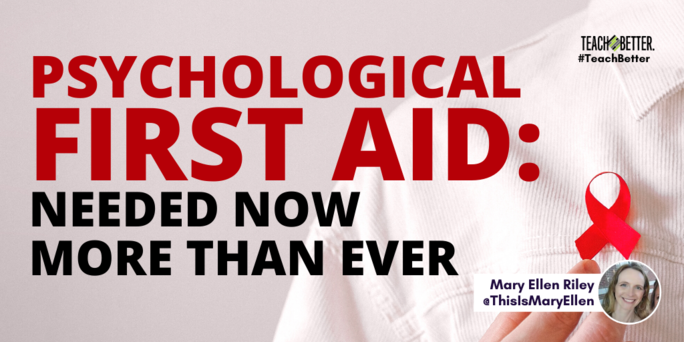TL;DR:
- Psychological first aid addresses immediate needs and teaches coping skills, and is just as important as physical first aid.
- If you notice someone in distress, look, listen, and link are the three steps to follow.
- Tips for sleeping well and reducing anger are shared.
Many of us have taken some kind of first aid class growing up, whether it was in a club or part of a class. I remember that we did this in Girl Scouts and then I took it again when I was pregnant. I wanted a refresher and discovered things had changed! It is always important to keep up to date with first aid as you never know when you will need it. For instance, good CPR songs are around 100-120 BPM to make the intended impact it is supposed to have, so researching these songs can help you be prepared.
As a kid, I was taught if someone isn’t breathing, use mouth-to-mouth resuscitation as well as chest compressions. Now, the instructor told me mouth-to-mouth isn’t necessary, especially if it is a stranger. (But I just checked the Red Cross website which does have MMR listed in their steps…so maybe it depends on your instructor.)
Now, I believe that physical first aid is extremely important. But as many of us are reading about, our mental health is just as important. All of us in any type of leadership position (administrators, pastors, teachers, nurses, parents, caregivers, managers, etc.) should be required to take Psychological First Aid as well.
If schools are pushing to be trauma informed, how can we ignore something so basic? If we are training for intruder drills, where is the training for the aftermath? Share on XI could argue everyone should take Psychological First Aid since it is just as important as knowing CPR. For now, I will start small and implore that all schools and business leaders learn this. If schools are pushing to be trauma informed, how can we ignore something so basic? If we are training for intruder drills, where is the training for the aftermath?
Myths.
There were a few myths that I was taught before that now are proven not true.
- People do not go through all the stages of grief. And many people do not go through them in order. Real life just doesn’t work that way. As someone who has experienced personal grief trauma, I would agree with this.
- People do not need to talk at length about their trauma. Making them talk about what happened makes them live through it again and again and may actually do more harm. This is what we learned after 9/11. Most people do not need professional help and will recover on their own.
- My professor has talked a little bit about Post Traumatic Growth. PTG occurs when a person goes through a trauma or crisis and grows as a result.
Now, some people DO struggle after a crisis and that is where Psychological First Aid can come in.
Psychological First Aid.
First, what is psychological first aid (PFA)? Similar to physical first aid, you are promoting safety, addressing immediate needs or acute distress, teaching coping skills, and finding resources to continue support.
Second, there are number of ways PFA is taught. I am taking Crisis Intervention, so many examples deal with disaster cases. You can use these tips when someone in distress calls you on the phone as well! I am including all the steps, but obviously if your friend is calling, you would not need step 1. In an emergency, you would follow the following steps.
Psychological First Aid Step 1: Look.
Contact and Engagement
- Check out the area – are you safe?
- Introduce yourself (name, title, organization name).
- Ask for the person’s name. Use their name when speaking to them. This allows the person to know you are listening and helps them feel calm.
- Address adults using last names (this was suggested in my training video).
Examples: “I noticed you seem upset. How can I help?” And then listen. If you don’t receive a response, you can say “I’m a good listener.”
Psychological First Aid Step 2: Listen.
Safety and Comfort
- Actively listen: Use eye contact, lean in, and give your full attention.
- Respect privacy: Try to talk in private or provide medical care behind a curtain.
- Extreme calm: There are some people extremely calm and may show no emotion. This person may have lost touch with reality. Just because someone is extremely calm does not mean they are not in need.
- If someone is in crisis here are a couple of techniques:
- Breathing: Breathe in through the nose and out through the mouth. Count to 5 breathing in and out.
- Grounding: Sit with arms and legs uncrossed. Take slow breaths. Name 5 non-stressful things you see. Take slow breaths. Name 5 non-stressful things you hear. Take slow breaths. Name 5 non-stressful things you can touch or feel. Take slow breaths.
Psychological First Aid Step 3: Link.
- After listening, we now know what they need. Here, we link a person in crisis up with services that are ongoing.
- Come up with an action plan and ask for any clarification. Some of these may be options: Go see the school counselor, or visit a key adult in the school building. For adults, this may include finding food, water, shelter, working with insurance, and linking with churches and other community resources.
Tips from crisis counselors.
- As a family, try to stay on the same schedule (this includes meal times and sleeping).
- Be understanding that everyone reacts differently.
- Establish old routines.
Sleeping can be difficult.
Tips to sleeping well include:
- Discuss the reasons for sleep disturbances.
- Establish a set wake time and go to bed time.
- Increase exercise (but not right before bed).
- Have a relaxation routine before bed.
Anger is very common as well.
Some coping strategies include:
- Exercise.
- Write in a journal.
- Prayer, meditation, or another positive activity.
- Headspace app or Calm.com.
- Look at the consequences, both positive and negative, of being angry.

If you would like to receive an online formal training program, here are two I found useful (and free!).
Sources:
National Child Traumatic Stress Network
About Mary Ellen Riley
Hello! I am Mary Ellen, a wife, mother of two, certified K-12 teacher, and crafts and coffee lover. As a mother and teacher of gifted students, I provide practical support throughout my schools for all students who need more depth and enrichment.
Visit Mary Ellen’s Websites:


